Restoration of urban marine ecosystems through Nature-based Solutions
Picture by Oleg Prachuk on Pexels.
Cities need to protect, conserve and restore urban marine ecosystems to preserve well-being and progress sustainably.
On the 13th of June 2023, a technical meeting was held in Barcelona on urban marine ecosystems restoration. This meeting was organised in the framework of the UN Restoration and Ocean Decades and the controversial forthcoming EU Restoration Law. EUROPARC’s policy and project manager Teresa Pastor took part in the event.
The meeting was hosted by the Institut de Ciències del Mar (Sea Science Institute). In 2021, they launched the Ocean Cities initiative – an international network of 27 institutions to promote sustainable ocean cities in a context in which resilience of coastal cities to climate change is a critical challenge for the coming decades.
At present, there are three reference frameworks in Europe to restore sea ecosystems in cities.
- UN Ecosystem Restoration Decade 2021-2030.
- EU Green (&Blue &Brown) Infrastructure Strategy (objective 2 of 2010-2020 Biodiversity Strategy)
- EU Nature Restoration Law – a key piece of the European Green Deal, that sets legally binding targets to rehabilitate degraded habitats, and which is currently under vote in the EP.
The invited speakers gave insight into the topic from different perspectives.
Main highlights of the meeting
The main highlights were:
- We need to protect and restore biodiversity, because both our health and economy heavily depend on it.
- The first priority should be protection– we need to protect effectively what is left.
- The second priority should be restoration – soundly applying the principles of conservation biology.
- The third priority should be effective management – applying an ecosystem-based management approach.
- Restoring marine ecosystems should go beyond introducing artificial substrates (e.g. concrete blocks) to enhance biodiversity. The aim should be to recover the fully functioning ecosystem, i.e. the whole community that was there before urbanisation.
- However, there is a lack of reference ecosystems due to the extreme exploitation oceans have been submitted causing the shifting baseline syndrome (Pauly 1995).
- With restoration projects, ecosystems can be restored to a high degree, but hardly ever to their original state, as for this we are dealing with unknowns.
- Therefore, a new concept has emerged in conservation and restoration ecology: novel ecosystems, which are ecosystems that due to human influence differ from those that prevailed historically.
- The Society for Ecological Restoration distinguishes three phases in what would be a restoration continuum:
- Reduction of impacts
- Rehabilitation – improvement, but not full restoration of the original habitat
- Ecological restoration
- Effective restoration should focus first on habitat-forming species that can act as ‘climate rescuers’ e.g. seagrasses, salt marshes, mangroves, kelp forests, coral reefs and shellfish reefs, which form natural coastal protection and thereby help to adapt to increased storminess, seal level rise and flood risks resulting from climate change.
- Secondly, the goal is to recover the whole community to obtain all the potential ecosystem services.
Restoration can be twofold:
- passive: elimination of the factors of pressure (e.g. removal of ghost nets) and let nature come back
- active: restoration of vanished species (e.g. fixing coral)
Use of Nature-based Solutions to restore urban marine ecosystems
There are different interpretations of what Nature-based Solutions (NbS) consists of. In order to harmonize the concept, the IUCN has prepared the NbS Global Standard. For further reading, also check out “Planning and delivering Nature-based Solutions in Mediterranean cities: First assessment of the IUCN NbS Global Standard in Mediterranean urban areas. Executive summary” here.
Outreach and Activity Report: European Day of Parks 2023
On the 24st of May we celebrated the European Day of Parks 2023 – Building on our Roots. This year, we brought special attention to our shared natural heritage and the responsibility we have to take care of it for future generations. Have a look at what was happening across Europe here!
European Day of Parks 2023 – Outreach and Activity Report
Thanks to the support of our members and partners on the ground, the European Day of Parks was once again a big success! The European day of Parks (EDoP) aims at bringing people closer to Nature by offering a diversity of activities and events in Protected Areas across the EUROPARC Network. The events that were organised addressed people of all ages: children, youngsters, young adults, families and seniors. This year, we focussed on “Building on our Roots”. The theme was chosen to highlight how we all have the responsibility of protecting, and expanding our natural heritage. A fitting topic, as we celebrate EUROPARC’s 50th Anniversary in 2023.
This year, it was a joy to see so many events take place once again throughout Europe! Our network led its creativity flow and over 150 events were organised and registered on our website, with many more taking place on the ground.
There was quite a buzz on social and traditional media as well, providing a great multiplier effect. Once again, the European Day of Parks put Europe’s Protected Areas in the spotlight they deserve! To get an overview of all that was happening in the media, have a look at our Media and Activity report:
The report is best viewed in Google Chrome, links might not work when using other servers.
We want to thank everyone that made this European Day of Parks a success!
Promotional materials
The EUROPARC Federation is the promoter of the European Day of Parks. To support our network, we create a special banner, that we translate into many European languages. Furthermore, we created guidelines to help Parks and Protected Areas get inspired:
About the European Day of Parks
Imagine a day when all Parks and Protected Areas come together across Europe, celebrate their successes and declare the value and benefits of Europe’s Protected Areas to communities, decision-makers and the wider public. That is EUROPARC’s European Day of Parks!
Every year, European Day of Parks takes place on and around 24th of May. It aims to bring people closer to nature and raise public awareness on the importance of the natural beauty preserved in Protected Areas and the importance of conservation and sustainable management of those places.
Check here to see the previous editions.
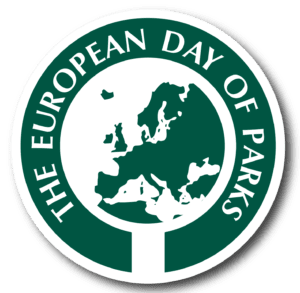

Advancing institutional recognition of the European Charter of Sustainable Tourism in Protected Areas
The European Charter of Sustainable Tourism in Protected Areas (ECST) is getting stronger visibility at the EU institutional level.
Bringing the ECST and EU institutions closer together
This is great news for our Sustainable Destinations and Sustainable Partners!
Three recent important steps confirmed the high interest on this topic:
- EUROPARC Federation was selected to be part of the Commission Expert Group ‘Together for EU Tourism – T4T’ for the next three years. Our project manager Teresa Pastor will participate in the greening transition for tourism sub-group.
- EUROPARC Federation was invited to submit pledges to the EU Transition Pathway for Tourism.
- DG GROW and the EC Joint Research Centre (JRC) announcement that they are considering equating ECST 2 (accommodations) with the EU ecolabel.
EUROPARC Federation membership of the T4T Commission Expert Group
The inaugural online meeting of the Commission Expert Group Together for EU Tourism took place on the 22 of June 2023.
The main tasks of this group are:
- assisting DG GROW in the preparation of policy initiatives resulting from the Transition Pathway in the field of tourism;
- supporting cooperation and coordination between the Commission, Member States and stakeholders on questions relating to the implementation of Union legislation, actions, programmes and initiatives in the field of tourism, in particular the Transition Pathway for Tourism;
- bringing about an exchange of experience and good practice in the field of tourism in support of the implementation of the Transition Pathway for Tourism;
- following up actions in the European Agenda for Tourism 2030.
Teresa Pastor will participate in the Green Transition for Tourism subgroup, which will provide strategic support to the Commission and the overall stakeholder community, and deliver best practices in the EU tourism ecosystem across sectors.
EUROPARC Federation invitation to submit pledges to the EU Transition Pathway for Tourism
As the 2021 Updated Industrial Strategy highlights the need to accelerate the green and digital transitions of EU Industry, a co-creation process was launched to create a Transition Pathway for Tourism.
EUROPARC’s pledges of contribution include:
Comprehensive tourism strategies development or update (topic 4) pledge
- 100 Protected Areas in 2024 certified by EUROPARC have a local strategy of sustainable tourism, regularly internally monitored and revised each 5 years by EUROPARC verifiers.
Collaborative governance of tourism destinations (topic 5) pledge
- 100 Protected Areas have an active Forum in 2024, organised on the base of local needs and contexts.
The Forum participates in the identification and realisation of an ECST strategy and action plan. It is then regularly internally monitored & revised every 5 years, after the evaluation provided by EUROPARC verifiers.
Green transition of tourism companies and SMEs (topic 8) pledges
By 2026:
- In 100 ECST Protected Areas, tourism companies and SMEs are involved in the Forum;
- In 50 ECST Protected Areas, tourism companies and small and medium-sized enterprises adhere to the 2nd step of the ECST programme, thus becoming a Sustainable ECST Partner;
- at least 10 Tour operators adhere to the step 3rd (become a Sustainable Tourism Operator) of the ECST;
- The ECST Stars Competition is organised every two years and the Award ceremony is organised at the European Parliament in Brussels.
Easily accessible best practices, peer learning and networking for SMEs (topic 11) pledge
By 2026, ten case studies in will be published in the Knowledge Hub of EUROPARC website and will be promoted in news and social media.
Consideration for ECST 2 (accommodations) as an EU ecolabel.
The European Commission Joint Research Centre (JRC), in collaboration with the Commission’s DG GROW has developed the EU Tourism Dashboard. This flagship initiative is aimed at supporting the green and digital transitions of the tourism sector towards higher resilience and sustainability.
In 2022, the JRC surveyed entities managing ecolabels of tourist accommodation establishments operating in Europe. EUROPARC participated in the survey.
JRC is currently developing a new indicator on the adoption of ecolabels in the 27 EU member states. ECST 2 awarded to accommodations is being considered as a valid ecolabel for this indicator.
The indicator will be published in the next update of the EU Tourism Dashboard, foreseen for Q4 of 2023.
LIFE ENABLE | A thrilling and intense first half of 2023
LIFE ENABLE has had an exciting year so far! Several reasons for celebration are in order!
It all started in February with the European Nature Academy Induction Meeting 🌍💪🧠🤓
Take a look at the short video:
We met the first intake of participants in person and kicked off their collaborative learning groups – “PODs”. This was a wonderful start to the ENA journey
Without a doubt, this diverse group of 59 managers from 24 countries brings a wealth of experience, enthusiasm and passion to learn to the European Nature Academy:
The energy, positivity and hunger to network was openly evident in the Induction meeting: we could not have asked for a better start to the European Nature Academy.
European Nature Academy
Following the Induction meeting, we continued our collaboration online – on the European Nature Academy.
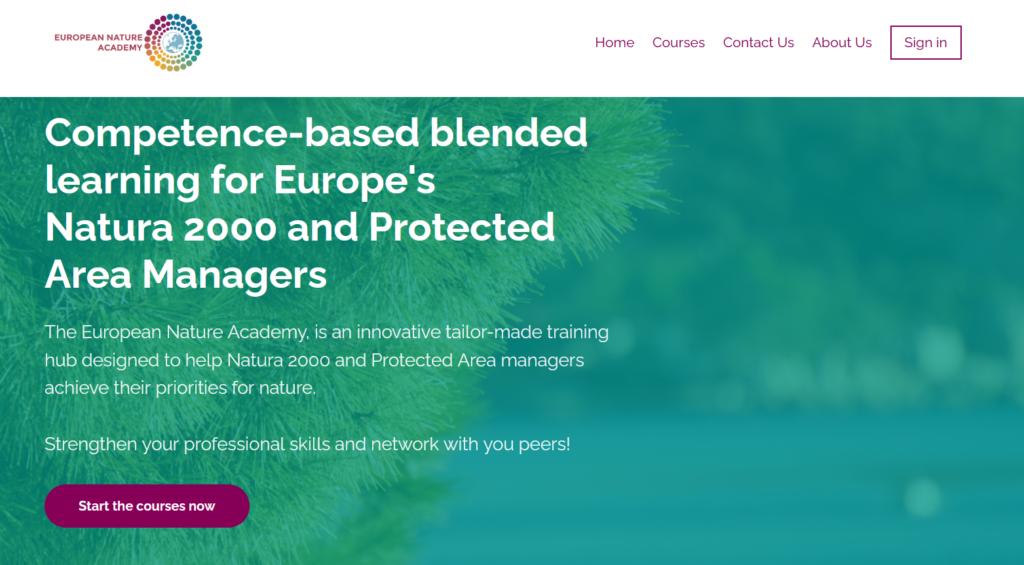
Between March and June, participants took part in 11 Online Modules during Course 1 | Core Competencies for Effective Management of Natura 2000 & Protected Areas across Europe. They have also been introduced to the Marine and Forest Courses, as well as Train the Trainers Induction Courses.
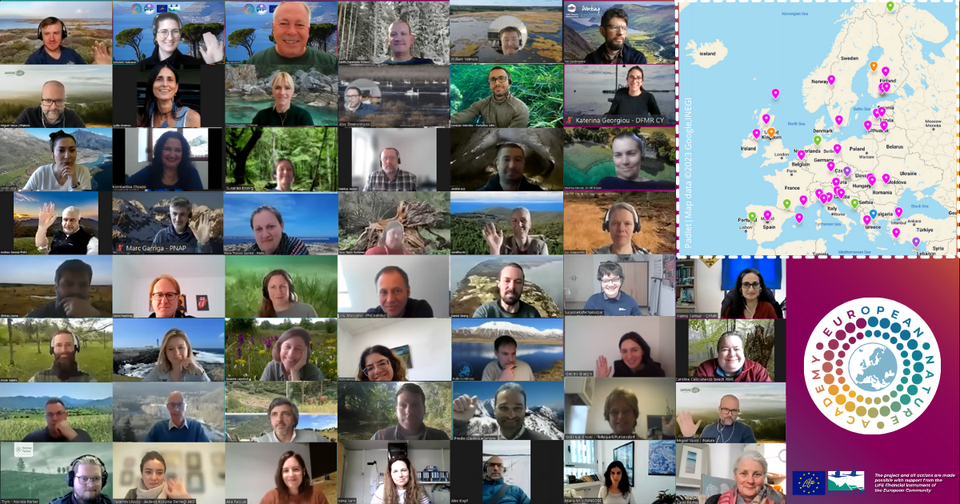
Modules included specialised interactive online sessions, some also featuring case studies and guest speakers, including:
- Federico Minozzi | Managing Director, EUROPARC Federation
- Santtu Kareksela | Senior Specialist (Nature conservation) in Parks & Wildlife Finland
- Stefano Santi | Co-chair of the EUROPARC Transboundary Cooperation Task force
- Jorge Sánchez-Cruzado | Altekio S.Coop
- Nicolette Bolté | Area developer Experimental Gardens and Marketing, NP Weerribben-Wieden
- Silvia Argentiero | Communication, social media and press relations, Parco Nord Milano
- Emanuele Raso & Francesco Marchese, Cinque Terre National Park: Actions and project for the management of a cultural landscape | StoneWallsForLife project.
- Daniel Åberg, Elena Bazhenova, Jimena Castillo, Kullaberg Nature Reserve
- Conchi Piñeiro | Altekio S.Coop.
Putting acquired skills to use
During their ENA Journey so far, participants also completed several individual and POD tasks, enabling them to apply their learning to benefit their Natura 2000 sites and Protected Areas. One of the tasks was also to make a short video.
Have a look at the winning video from our POD Resilient Forests!
You can also check out Yellow Submarine POD’s video, which took 2nd place!
The video from POD Oak can be seen here.
The journey continues!
Our participants have busy summer months ahead of them.
Working on their ENA Assignments, Marine, Forest and Train the Trainers Courses.
We are already looking forward to the second intake of participants that will have the opportunity to apply toward the end of 2023! 🤩
Read about LIFE ENABLE!
In English and Spanish
LIFE ENABLE has been featured in several publications. Most recent ones include:
“Being close – News from the Alfred Toepfer Academy for Nature Conservation”
Available in English
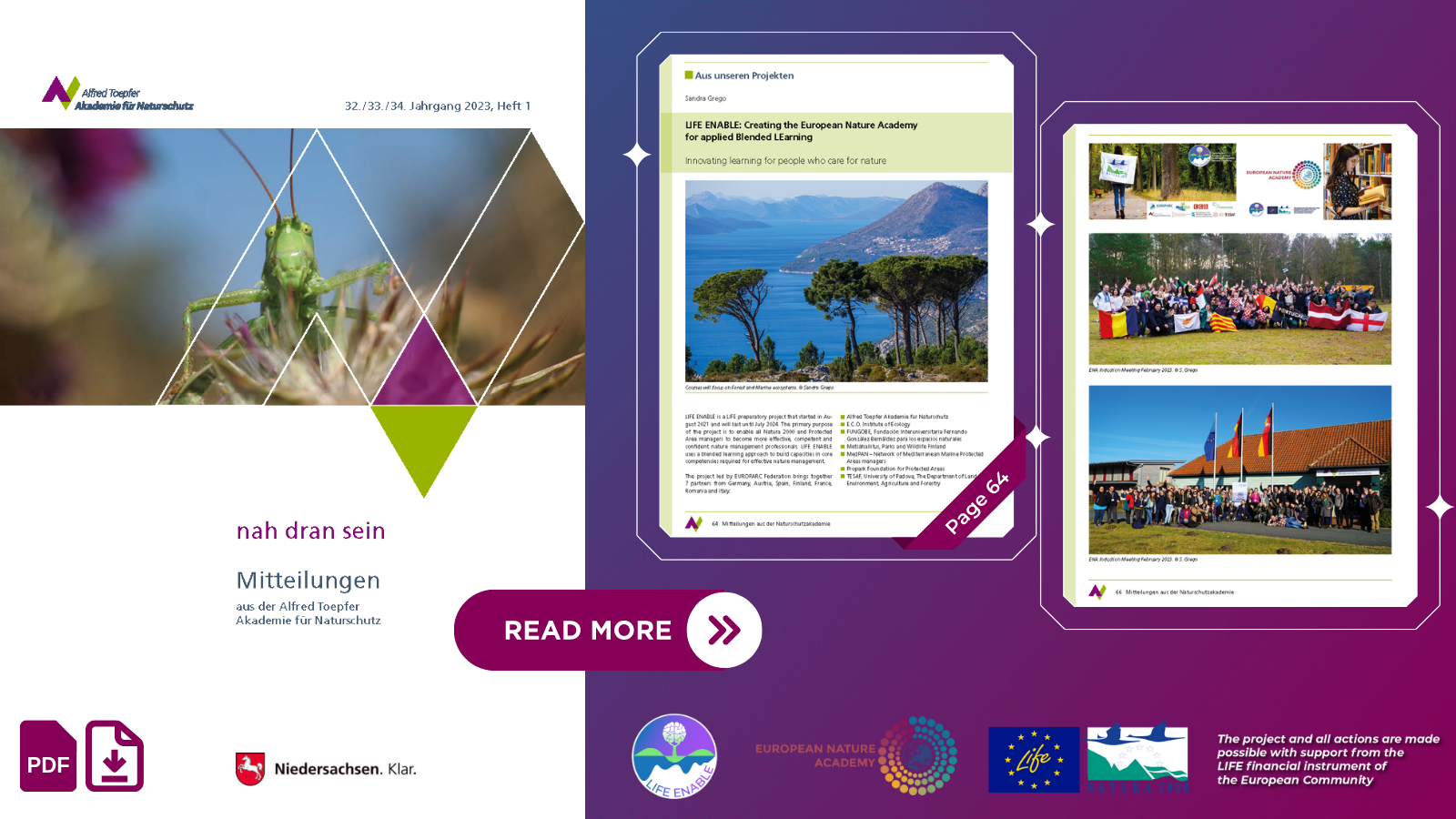
Available in Spanish
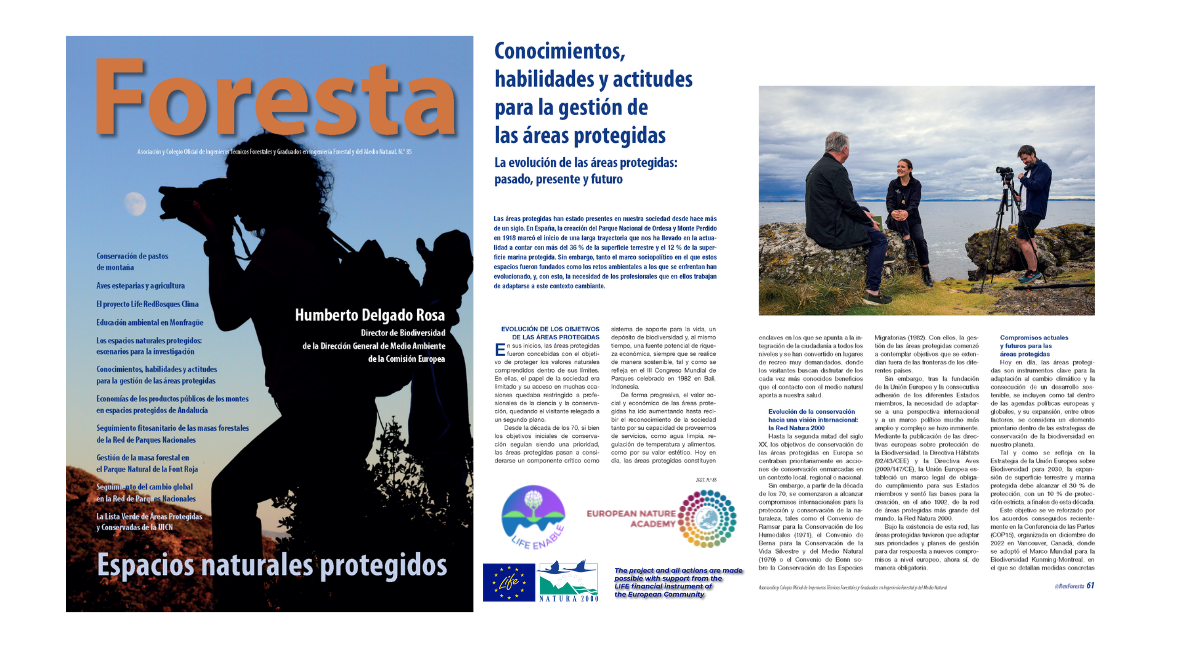
We wish you happy viewing & reading! 🤓📰
LIFE ENABLE Team
